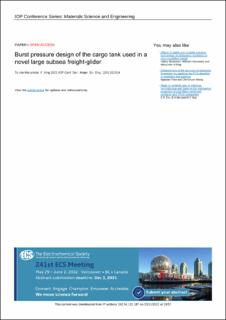| dc.contributor.author | Xing, Yihan | |
| dc.date.accessioned | 2022-01-04T12:50:34Z | |
| dc.date.available | 2022-01-04T12:50:34Z | |
| dc.date.created | 2021-11-23T20:45:13Z | |
| dc.date.issued | 2021 | |
| dc.identifier.citation | Ying, X. (2021) Burst pressure design of the cargo tank used in a novel large subsea freight-glider. IOP Conference Series: Materials Science and Engineering, 1201, 012014 | en_US |
| dc.identifier.issn | 1757-8981 | |
| dc.identifier.uri | https://hdl.handle.net/11250/2835991 | |
| dc.description.abstract | This paper presents the burst pressure design of the cargo tank used in the University of Stavanger (UiS) Subsea Freight-Glider (USFG). The USFG is an innovative large underwater cargo glider drone that is 50 m long and has a DWT of 1500 ton. It uses variable-buoyancy propulsion instead of traditional propellers for movement. This is an extremely efficient propulsion method and allows the USFG to achieve an average energy consumption of less than 10 kW. Structural weight is a premium as the USFG is required to be neutrally buoyant in water. Therefore, the design of the cargo tank which is the largest component in the USFG needs to be optimal for minimal structural weight. One approach used in design optimisation is to utilise design codes and/or methods that are more precise and therefore allow for lower safety margins. This approach will be investigated in this paper for the burst pressure design of the cargo tank. The different parts of ASME BPVC codes will be compared. The sensitivity of the codes to changes in design parameters is also investigated. Lastly, some comments on the use of reliability methods to further optimise the design are also presented. | en_US |
| dc.language.iso | eng | en_US |
| dc.publisher | IOP Publishing | en_US |
| dc.rights | Navngivelse 4.0 Internasjonal | * |
| dc.rights.uri | http://creativecommons.org/licenses/by/4.0/deed.no | * |
| dc.subject | undervannsteknologi | en_US |
| dc.title | Burst pressure design of the cargo tank used in a novel large subsea freight-glider | en_US |
| dc.type | Peer reviewed | en_US |
| dc.type | Journal article | en_US |
| dc.description.version | publishedVersion | en_US |
| dc.subject.nsi | VDP::Teknologi: 500 | en_US |
| dc.source.volume | 1201 | en_US |
| dc.source.journal | IOP Conference Series: Materials Science and Engineering | en_US |
| dc.identifier.doi | 10.1088/1757-899X/1201/1/012014 | |
| dc.identifier.cristin | 1958155 | |
| dc.source.articlenumber | 012014 | en_US |
| cristin.ispublished | true | |
| cristin.fulltext | postprint | |
| cristin.qualitycode | 1 | |

